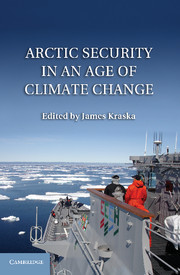Description
Arctic Security in an Age of Climate Change
Coordinator: Kraska James
This book examines Arctic defense policy and military security from the perspective of all eight Arctic states.
Language: English
Arctic Security in an Age of Climate Change
Publication date: 05-2013
Support: Print on demand
Publication date: 05-2013
Support: Print on demand
Arctic security in an age of climate change
Publication date: 07-2011
342 p. · 15.5x22.9 cm · Hardback
Publication date: 07-2011
342 p. · 15.5x22.9 cm · Hardback
Description
/li>Contents
/li>Biography
/li>
This book examines Arctic defense policy and military security from the perspective of all eight Arctic states. In light of climate change and melting ice in the Arctic Ocean, Canada, Russia, Denmark (Greenland), Norway and the United States, as well as Iceland, Sweden and Finland, are grappling with an emerging Arctic security paradigm. This volume brings together the world's most seasoned Arctic political-military experts from Europe and North America to analyze how Arctic nations are adapting their security postures to accommodate increased shipping, expanding naval presence, and energy and mineral development in the polar region. The book analyzes the ascent of Russia as the first 'Arctic superpower', the growing importance of polar security for NATO and the Nordic states, and the increasing role of Canada and the United States in the region.
Part I. Introduction - Circumpolar Perspectives: 1. Arctic security: the indirect approach Franklyn Griffiths; 2. The challenges and security issues of Arctic marine transport Lawson Brigham; 3. Arctic meltdown and its implications for shipping and ports in Asia Joshua Ho; Part II. European Security Interests in the Arctic: 4. Arctic security and Norway Rolf Tamnes; 5. Norway and the Arctic: between multilateral governance and geopolitics Geir Flikke; 6. Military aspects of Russia's policy: hard power and natural resources Katarzyna Zysk; 7. The next geographical pivot: the Russian Arctic in the twenty-first century Caitlyn Antrim; 8. The rise of the Arctic on the global stage Pauli Järvenpää and Tomas Ries; 9. The Arctic challenge to Danish foreign and security policy Nikolaj Petersen; 10. Arctic security - a Greenland perspective Adam Worm; 11. Territorial discourses and identity politics: Iceland's role in the Arctic Valur Ingimundarson; Part III. North American Security Interests in the Arctic: 12. Canada's security and foreign policy in the Arctic Robert Huebert; 13. Polar race or polar saga? Canada and the circumpolar world Whitney Lackenbauer; 14. American security in the Arctic James Kraska; 15. Arctic security considerations and the US Navy's roadmap for the Arctic David W. Titley and Courtney St John.
Dr James Kraska serves as the Howard S. Levie Chair in Operational Law at the US Naval War College, where he also teaches on the faculty of the International Law Department. Kraska is a commander and judge advocate in the US Navy who served as legal adviser to joint and naval task force commanders in the Asia-Pacific and completed four Pentagon major staff assignments. He was the principal military contributor to the president's US Arctic Region Policy, and he coordinated Arctic issues and Law of the Sea for the armed forces at the National Security Council and International Maritime Organization. Author of Maritime Power and the Law of the Sea (2011), Kraska also holds appointments as Senior Fellow at the Foreign Policy Research Institute in Philadelphia and as Guest Investigator at the Marine Policy Center, Woods Hole Oceanographic Institution in Woods Hole, Massachusetts. In 2010, he was selected for the Alfred Thayer Mahan Award for Literary Achievement by the Navy League of the United States.
© 2024 LAVOISIER S.A.S.




